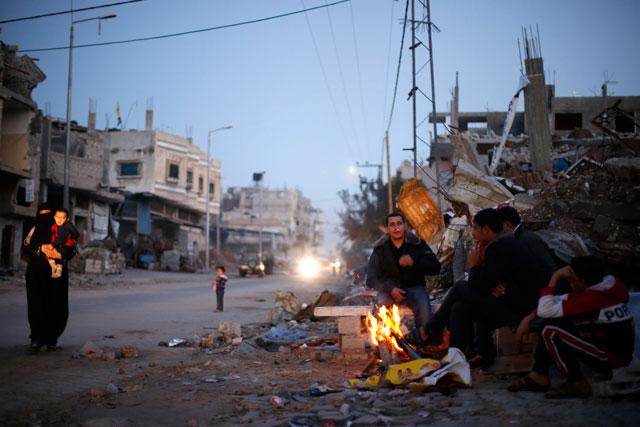You are here
Israel to hold snap vote as Netanyahu gambles on return
By AFP - Dec 03,2014 - Last updated at Dec 03,2014

OCCUPIED JERUSALEM — Israeli political leaders agreed Wednesday to hold a snap election next March, with Prime Minister Benjamin Netanyahu gambling on a return to power after his ruling coalition collapsed.
Parliament's spokesman said the vote would be held on March 17, after Netanyahu tore apart his fractious coalition government by firing two centrist ministers and calling for the early polls.
With Israeli-Palestinian tensions running high, polls show Netanyahu's Likud and other rightwing parties are likely to increase their share of the vote from the previous election held just last year.
Another win for the Israeli right would leave little hope for Middle East peace talks, after the last round of negotiations collapsed with no progress and following a spate of violence in Jerusalem and the West Bank.
Netanyahu appealed to voters to grant Likud a "clear mandate", expressing frustration at nearly two years of coalition politics.
"Against the serious challenges facing the state of Israel — security, economic and regional — there is a need for a large and experienced ruling party," he told a meeting of Likud lawmakers.
"Anyone who wants to give a clear mandate to a prime minister from Likud needs to give many seats to the party," he said.
The procedure to adopt a law to dissolve the legislature began Wednesday, with lawmakers at the 120-member Knesset passing a preliminary reading of the bill.
The law will need to gain approval another three times at parliament before the Knesset is dissolved. It is unclear how long that will take but there is little doubt the bill will be approved.
The last general election was in January 2013, and the next poll had not been officially due until November 2017.
Cracks in Netanyahu's right-leaning coalition emerged over the 2015 budget and a contentious bill aimed at enshrining Israel's status as the Jewish state in law, a move critics say would institutionalise discrimination against minorities including Arabs.
The crisis came to a head on Tuesday, when Netanyahu fired two key ministers: Finance Minister Yair Lapid, who heads the Yesh Atid party, and Justice Minister Tzipi Livni, who heads HaTnuah.
The two parties combined account for 25 of the government's 68 seats.
Hardliners on the rise
Netanyahu accused them of "acting against the government from within" and hatching a plot to overthrow him.
"It's called a putsch," he said in a televised address shortly after firing them.
According to the latest polls, Netanyahu's Likud is expected to win 22 to 24 seats in parliament, compared with the 18 it now holds.
Another rightwing government would reduce the chances of resuming the Middle East peace process, observers say, after the last, US-backed negotiations collapsed amid recriminations in April, notably over the issue of Israel's settlement building on Palestinian territory.
Hardline ministers in Netanyahu's coalition have pushed to step up the construction of Jewish settler homes in the occupied West Bank and annexed East Jerusalem, drawing international condemnation and angering Palestinians who want that land for their future state.
Netanyahu has already indicated that he would like to renew his traditional ties with his party's "natural allies" the ultra-Orthodox, who were relegated to the opposition in the last election.
Jewish Home, a far-right national-religious party headed by Economy Minister Naftali Bennett which strongly backs settlement building, is expected to see the strongest gains in the vote, securing 16-17 seats compared with the 12 it won in 2013, according to the polls.
Centrist parties like Yesh Atid and HaTnuah are expected to see major losses. The left, including the once-dominant Labour Party, is also expected to fare poorly.
The vote call comes amid a fresh wave of violence that has set Israel on edge, including regular unrest in Jerusalem and a series of deadly "lone wolf" attacks by Palestinians on Israelis.
Commentators said relations with the Palestinians would feature in the election campaign, but that the vote would be decided more on personality than on real issues.
"The strains of the Arab-Israeli conflict are crucial," political scientist Avraham Diskin told AFP.
"But like in other countries the personality of this or that person" would ultimately decide the outcome, he said.
"There's a very good chance that Netanyahu will continue to be the prime minister."
Related Articles
Lawmakers in the Israeli parliament on Monday voted to dissolve the assembly and confirmed March 17 as the date for a snap general election.
OCCUPIED JERUSALEM — Prime Minister Benjamin Netanyahu's strongest challengers in Israel's April general election joined forces on Thursday,
Three days ahead of Israel's general election, there was growing uncertainty Saturday over who will win the premiership even as polls showed Prime Minister Benjamin Netanyahu trailing his centre-left rivals.

















